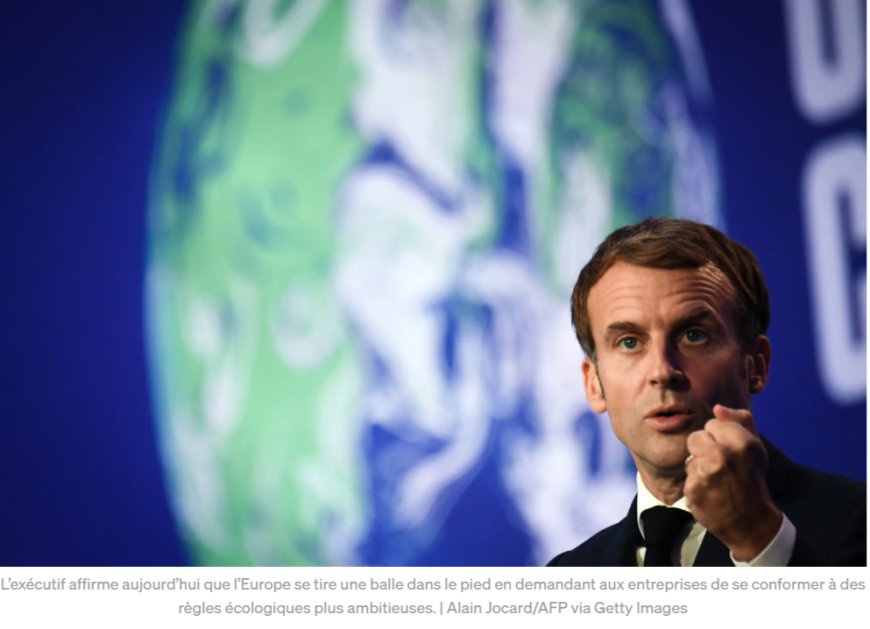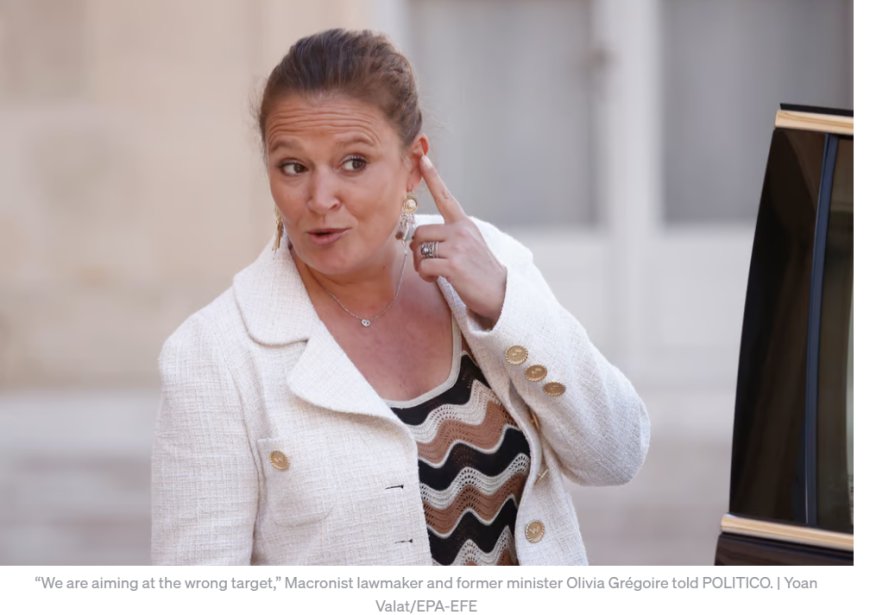Macron’s U-Turn on EU Green Rules Sparks Internal Revolt and Threatens Environmental Legacy
Emmanuel Macron’s opposition to EU green regulations has sparked internal revolt, threatening his environmental legacy and Europe’s leadership in the global climate agenda.

The French president's anti-regulation stance has infuriated many members of his party and cast doubt on his environmental legacy.
PARIS— Even among his supporters, Emmanuel Macron's recent campaign against European green regulations is infuriating people.
Prominent figures from the French president's team are opposing Paris's attempt to weaken future EU regulations that would require businesses to disclose their supplier chains' possible human rights abuses and environmental impact.
They lament that France has violated its standing as one of Europe's most vocal proponents of the green movement and caution that giving in to anti-green pressure from industry associations and non-EU nations, particularly the US, will not benefit France or the EU in the long run.
Former minister and Macronist MP Olivia Grégoire told POLITICO, "We are aiming at the wrong target," in support of the Corporate Sustainability Reporting Directive, which mandates that businesses reveal their environmental impact and climate change risk exposure. Until recently, France was a major supporter of the directive.
As a minister who negotiated the CSRD's wording in Brussels, Grégoire put it thus way: "I fear disavowal, I fear that we are naive enough to think for a minute that we'll be able to confront the new American economy with the tools it uses itself."

In a confidential note made public by POLITICO last month, France urged the European Commission to postpone the CSRD by two years and to postpone a new EU directive on corporate due diligence (CSDDD) indefinitely. This was part of the Commission's proposed "omnibus" legislation to streamline those two laws, which is scheduled to be released on February 26.
The French government now claims that by requiring businesses to adhere to stricter green regulations, Europe is putting itself in a bad position.
Macron's January appeal for a "massive regulatory break," characterizing the new regulations as a threat to Europe's faltering economy, was the pinnacle of that push.
We have backed some legislation with the best of intentions, and I agree with their philosophies. We must be able to suspend them until we're able to compete again, though, given the situation we're in right now," Macron told French ambassadors.
The European Commission has shifted its focus from green policymaking to pro-business industrial policy, including measures like the omnibus package that cut red tape, in response to last year's European election. This shift reflects Macron's U-turn. That change is causing discontent among Macron's liberal friends and is perceived by many as a surrender to right-wing forces that are expanding throughout Europe.
Gregoire warned that if Europe doesn't follow its green reporting guidelines, it would eventually follow those set by other nations like Washington. "Let's not give in to populism that consists in thinking, like the far right, that every time there is a rule, you shoot against it," she said. The next president of the United States, Donald Trump, has completely disapproved of Joe Biden's environmental initiatives.
From Macron's Renew Europe group, French MEP Pascal Canfin stated, "We don't see any reason to postpone." Renew's stance is "yes to simplification, but no to delay."
Trumpism-light.
France was among the first EU nations to enact a national due diligence law in 2017. The French government proudly promoted the EU due diligence directive, which mandates that businesses verify that their suppliers adhere to environmental and forced labor regulations, as a European expansion of what France had done domestically. When France assumed the rotating presidency of the Council of the European Union in 2022, French ministers and even Macron prioritized the CSRD and the due diligence directive in their economic agenda. Despite this, some criticized France for not being as supportive of the text as it claimed to be in public.
However, the French government has sided with European industry groups who have been arguing that too much red tape will hurt them compared to their rivals, particularly in the United States and China.
Speaking on condition of anonymity, a French business lobbyist with firsthand knowledge of the negotiations explained that they were "positively surprised" by how the French position had changed and that Macron's administration had been instrumental in that development. However, the surprise was not as well received by Macron's allies.
"In recent years, France was the one who defended and secured these accomplishments at [the] European level. Starting a movement that would overturn rules and standards is unacceptable.
In January, Macron's party member and chair of the National Assembly's European affairs committee, MP Pieyre-Alexandre Anglade, informed his colleagues.
The proposal was also criticized by Clément Beaune, Macron's Europe minister during the French EU presidency, who cautioned about the risks of Europe and France experimenting with "light Trumpism."
Changing the political landscape
Following the emergence of populist anti-green forces throughout Europe, France underwent a steady transition. Months before an EU election in which right-wing parties gained ground, Macron's 2023 call for a "regulatory break" was interpreted as a jab at conservative parties and voters.
These remarks compelled the Elysée to make it clear that Macron was not challenging the texts—like the CSRD and the due diligence directive—that had already been agreed upon or were being negotiated.
However, it was evident that France was already doubting several of the main components of the EU's Green Deal when Macron redoubled his efforts last month and demanded a "massive regulatory break," so there was no need to explain his reasoning.
According to Phuc-Vinh Nguyen, head of the Jacques Delors Energy Center in Paris, France's shift in stance was influenced by the emergence of right-wing political forces that were critical of EU green regulations and the growing number of complaints from influential corporate groups.
However, French officials emphasize that the primary force behind that shift is the geopolitical environment, as European businesses find it difficult to compete with their American and Asian counterparts.
A French diplomat was referring to reports on EU competitiveness and the single market that were filed last year by former Italian prime ministers Mario Draghi and Enrico Letta, respectively. "There have been many changes in context, but there has also been an objective observation, made in the Letta and Draghi reports, that Europe's appetite for regulation has become an obstacle to competitiveness," the diplomat said.
Some contend that Macron's lack of commitment to the fight for better green standards is demonstrated by France's recent stance.
"He served as a catalyst to advance stricter green requirements when it was widely agreed upon to create political momentum. Even though that was an obvious contradiction of his previous attitude, Nguyen stated that Macron's position changed as the political landscape shifted.
 Kinyarwanda
Kinyarwanda
 English
English









































































